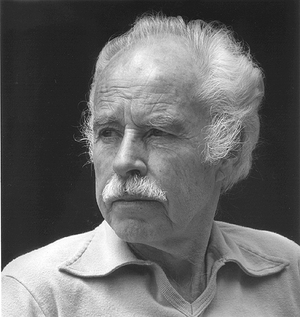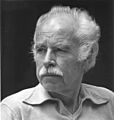Wright Morris facts for kids
Quick facts for kids
Wright Morris
|
|
|---|---|
 |
|
| Born | January 6, 1910 Central City, Nebraska, U.S.
|
| Died | April 25, 1998 (aged 88) Mill Valley, California, U.S.
|
| Education | Pacific Union College Pomona College (BA) |
| Occupation | Writer, photographer |
|
Notable work
|
The Field of Vision Plains Song: For Female Voices |
| Spouse(s) |
Mary Finfrock
(m. 1934; div. 1959)
|
| Awards | National Book Award, 1956 American Book Award, 1981 |
Wright Marion Morris (born January 6, 1910 – died April 25, 1998) was an American writer and photographer. He was known for his books and pictures about the people and places of the Great Plains. He also liked to try new ways of telling stories in his writing.
Contents
Early Life and Childhood
Wright Morris was born in Central City, Nebraska. His childhood home is now a special historical place. His mother, Grace Osborn Morris, passed away just six days after he was born. His father, William Henry Morris, worked for the Union Pacific Railroad.
After his mother's death, a nanny took care of Wright. Later, his father married Gertrude. Wright said Gertrude was closer to his age than his father's. Gertrude didn't like small towns, but she and Wright got along very well. They both loved games, movies, and ice cream!
In 1919, his family moved to Omaha, where they lived until 1924. During this time, Wright spent two summers on his uncle's farm near Norfolk, Nebraska. You can see pictures of this farm and characters like his Uncle Harry and Aunt Clara in Wright's books.
His Journey and Career
In 1924, Morris moved to Chicago. Later that year, he went on a road trip to the west coast with his father. This trip later inspired his first book, My Uncle Dudley. He also lived briefly with his uncle in Texas.
Wright then went to college in California, first at Pacific Union College and then graduating from Pomona College in 1933. He married Mary Ellen Finfrock in 1934, but they later divorced in 1959. He then married Josephine Mary Kantor.
After college, Morris traveled around Europe. He later wrote about these travels in his book Cause for Wonder.
From 1944 to 1954, Morris lived in Philadelphia. From 1954 to 1962, he spent his time between California and Mexico. In 1963, he started teaching at San Francisco State College. He stopped teaching in 1975.
Wright Morris won the National Book Award for his book The Field of Vision in 1956. His last book, Plains Song, won the American Book Award in 1981.
He became good friends with other famous American writers, like John O'Hara and Thornton Wilder. He also wrote letters every week to Scottish author Muriel Spark from 1962 until he passed away.
Wright Morris died in Mill Valley, California, in 1998.
Selected Books and Works
- My Uncle Dudley (1942)
- The Man Who Was There (1945)
- The Inhabitants (a book with photos and text) (1946)
- The Home Place (a book with photos and text) (1948)
- The World in the Attic (1949)
- Man and Boy (1951)
- The Works of Love (1952)
- The Deep Sleep (1953)
- The Huge Season (1954) — This book was a finalist for the National Book Award.
- The Field of Vision (1956) — He won the National Book Award for Fiction for this book.
- Love Among the Cannibals (1957) — This was also a finalist for the National Book Award.
- Ceremony in Lone Tree (1960) — Another finalist for the National Book Award.
- Cause for Wonder (1963)
- One Day (1965)
- In Orbit (1967)
- A Bill of Rites, a Bill of Wrongs, a Bill of Goods (a collection of essays) (1968)
- God's Country and My People (a book with photos and text) (1968)
- Fire Sermon (1971)
- A Life (1973)
- Real Losses, Imaginary Gains (Short Stories) (1976)
- The Fork River Space Project (1977)
- Plains Song: For Female Voices (1980) — He won the National Book Award for Fiction for this book.
- Will's Boy (1981)
- "Victrola" (1982) (a short story in The New Yorker; won third prize for the O. Henry Award)
- Solo (1983)
- A Cloak of Light (1985)
- "Glimpse Into Another Country" (1985) (a short story in The New Yorker; won an O. Henry Award)
- Time Pieces: Photographs, Writing, and Memory (1989)
Awards and Special Recognitions
Wright Morris received many awards besides the National Book Awards for The Field of Vision and Plains Song.
He was given Guggenheim Fellowships in 1942, 1946, and 1954. These fellowships help artists and writers with their work. In 1975, he won the Mari Sandoz Award for his important contributions to books about Nebraska. In 1979, he received the Western Literature Association's Distinguished Achievement Award.
In 1981, he won the Robert Kirsch Award for his lifetime achievements in writing. In 1982, he was chosen for the Common Wealth Award for his great service in literature. In 1985, he was one of the first people to receive the Whiting Award. In 1986, he received a Creative Writing Fellowship from the National Endowment for the Arts.
Historical Places Connected to Wright Morris
Wright Morris often wrote about the places and lives he knew. Here are a few important historical spots linked to him:
Images for kids
 | Janet Taylor Pickett |
 | Synthia Saint James |
 | Howardena Pindell |
 | Faith Ringgold |


